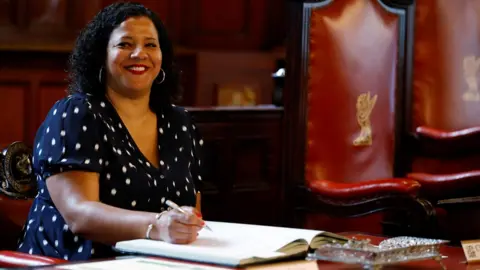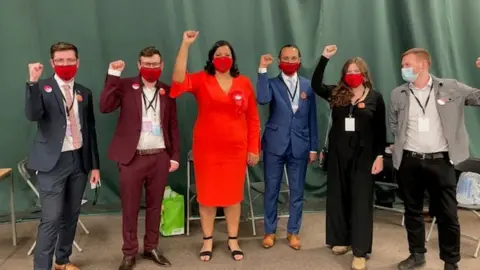Liverpool city mayor Joanne Anderson promises big changes
 PA Media
PA MediaThere are strong "under new management" vibes in some of the first official photographs of Liverpool's new directly elected mayor, Joanne Anderson.
Tweeted from her freshly branded mayoral account, one image shows her standing in front of the Town Hall which was lit up purple - the authority's corporate colour, a mixture of red and blue to appease fans of both football teams - in recognition of the changes ahead.
Above it she wrote "the Mayor of Liverpool".
The name might be almost identical to her Labour predecessor Joe Anderson - but she claims the similarities end there.
Earlier this week, Ms Anderson emailed the council's previous cabinet to tell them their services would no longer be required.
It's understood she's asked all current Labour councillors to apply for roles in her administration, setting out their area of expertise and interests.
There's also a suggestion she may bring in expert advisors who aren't current councillors. She'll need to have finalised her cabinet by 26 May.
But the newly-elected mayor may herself only be in the job for two years.
Liverpool City Council is set to agree major changes to the way the city is run, in the aftermath of a damning report into aspects of its operations.
It could mean voters in the city being asked whether they want to scrap the role of elected mayor next year - 12 months earlier than planned.

The city council has formally set out its response to the damning inspection report published by Max Caller in March.
That report resulted in government appointed commissioners being sent in to oversee several troubled departments; highways, planning, regeneration and property management.
Mr Caller's report also recommended changes to some of the council's political and governance structures.
One of the proposed changes put forward is to switch the electoral cycle to all-out elections every four years from 2023.
Currently city councillors are elected in thirds with elections taking place in three of every four years. Mr Caller said this means the council is almost always in election mode.
Another recommendation is to reduce the number of councillors.
At the moment the authority has 90 elected members, with three councillors serving each ward.
This number could be reduced to between 70 and 80, with ward boundaries significantly redrawn and just one member elected per ward.

The council said it would take six weeks to develop a new proposal setting out the specific number of councillors on a predominantly single member ward basis, which will be brought forward at a special council meeting.
And then there's the issue of the role of directly elected mayor. A position that was created in 2012, without a referendum asking people in Liverpool if they supported the idea.
A letter from council chief executive Tony Reeves to the government published ahead of next week's meeting says the authority is considering a motion that would bring forward the date of a referendum on the position of the city mayor to next year.
The council's already committed to asking residents whether they want to stick with a mayor or would rather move to a leader and cabinet or committee system - in 2023.
But in his letter to the government outlining their improvement plan, Mr Reeves said the date could be brought forward.
He said: "The council is considering a motion to bring forward the date of the proposed referendum on a City Mayor from 2023 to 2022 allowing the Secretary of State the time to make any necessary legislative changes to align the Mayoral and all out election cycles as a result of that referendum."
'Sack myself'
A move to scrap the role of elected mayor and return to a council leader and cabinet style of governance has been proposed by Liverpool's opposition Liberal Democrats on several occasions. They believe the role sees too much power concentrated in the hands of one person.
However, proponents of the mayoral model - including the leader of the Liberal group on the council, Steve Radford - believe it provides a high profile spokesperson for the city and is more accountable to the electorate, who can vote a mayor out - something they can't do with a council leader.
Ms Anderson campaigned to remove the position she has just won and said she would do so again.
In an interview with BBC Radio Merseyside, she said: "I've said I'd campaign to sack myself, and that's what I would do."

Why not follow BBC North West on Facebook, Twitter and Instagram? You can also send story ideas to [email protected]
